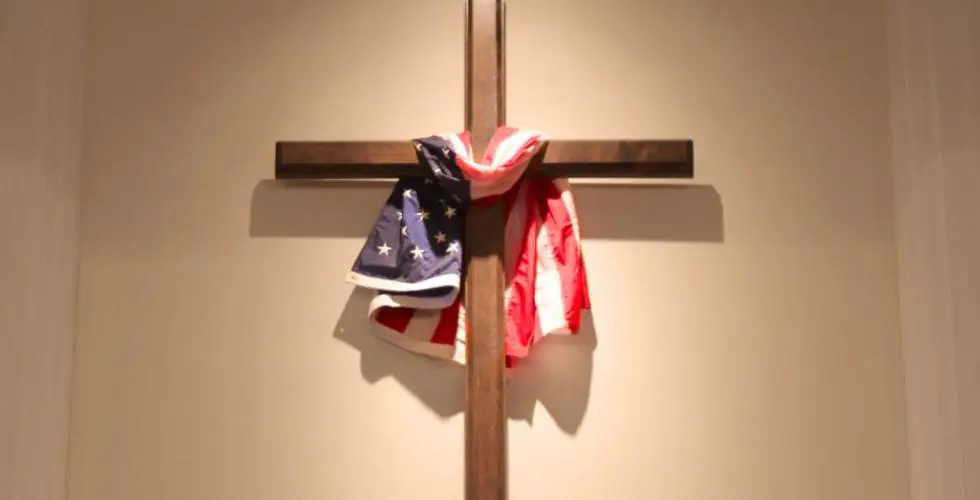
I recently attended our city council’s monthly public meeting. My daughter needed to sit in and take notes for a school assignment so I went with her. The meeting was well-attended, no doubt, due to this project. A local Boy Scout troop opened the meeting with a presentation of the colors and the Pledge of Allegiance. Then a local pastor came forward and prayed an invocation. It was standard fare but I took notice of how he concluded his prayer with, “And bless our efforts here in this meeting tonight.”
“Our efforts”? The pastor wasn’t trying to make a theological point with his prayer. By “our” he may have innocuously meant his fellow residents in the community. The “efforts” at hand this night, however, was the business of the city government. Tweaking a zoning issue here, approving a municipal works project there. Mundane stuff, for sure, but this was local government business.
This pastor’s prayer is a small-scale representation of a widespread and significant problem for the church in America: “we” don’t know who “we” are. When a pastor steps forward to offer prayers on behalf of an assembled group of people and refers to this gathering as “we,” what is the common denominator that makes us “we”? What is our identity? Christians have become too comfortable using “we” to primarily mean America. This confusion becomes especially apparent when the question becomes, “What are we going to do about ________?”
Professor Lee C. Camp raises this issue of identity in his book Mere Discipleship. When asked if our fundamental identity is that of citizens of the nation-state or citizens of the kingdom of God, most Christians would strongly affirm that our primary allegiance is to the kingdom of God. However, as Professor Camp explains:
Our debates often reveal that the fundamental identity, the primary lens through which we must make decisions about how to act in our world, is that of the nation-state. One might find ample evidence by simply examining the questions we often ask: “What should we do about terrorism?” The we in that question is most often, one may safely assume, the United States.
Camp goes on to offer other examples of challenges “we” need to do something about and adds, “And so the questions go, always assuming that the all-important we is the nation-state.” At this point the reader may be thinking, “Yeah, so? Of course it’s the government that needs to do something about terrorism.” Many other examples could be used: poverty, racial injustice, immigration, abortion. The common assumption goes unchallenged: these are matters for our elected officials to sort out.
Why don’t we consider the church when we ask these questions? Turning again to Camp, “What might happen if we took such questions seriously from a biblical viewpoint? For instance, what should we – as the body of Christ – do about homelessness…What should we who bear the name of Jesus do about inner-city poverty and the plight of single mothers? What should followers of The Way do about abortion? Does the word of God incarnate in Jesus Christ not have something to say to the injustices and oppression of our world? Or are the people of God simply to accept the claim that the only appropriate response to injustice is the ethic of nations, the ethic of power checking power?”
Followers of Christ relegate responsibility to the state because we have uncritically accepted the notion that “religion” is a private, individual matter merely concerned with issues of the interior soul. Like fish oblivious to the existence of water, we aren’t even aware of another way to perceive of faith. Politicians are more than happy to perpetuate this notion. When politicians speak of religious liberty (the verbiage has now subtlety shifted to “freedom of worship”), they mean the freedom to worship as you see fit within the confines of your church/house of worship. Therefore the state thinks things like: How could abortion or the contraceptive provisions of Obamacare violate the religious liberty of a business owner?! They’re still free to worship as they see fit at their church but this has nothing to do with how you run your business! We’ll let you do what you want in your church (for now), just keep it private.
“This ‘privatization of religion,’ this move to make religion a ‘private’ matter, results in a profound change of thought: when we ask the ‘what are we going to do about…’ question, we of course assume that the we is the nation or government, because we have long been trained to think of the church as having no social or political significance,” writes Camp. I would add the church has no social or political significance regarding taking responsibility for direct action. Christians still think they have political significance, of course, but this significance is merely that of a pressure group hoping to nudge the state in the right direction. Conservative and progressive Christians have different aims but they both share the notion that positive social change comes primarily by state power. Our task is simply to get the right people in charge of the state. Lost in all of this is the proper calling of the disciple of Jesus the Christ. Camp: “Consequently, discipleship – defined as taking seriously the way of Christ in all our affairs and concerns – gets shelved as irrelevant to the real concerns of the world.”
One of the reasons the church has allowed itself to be maneuvered into this position is because we have accepted the false notion that the life and teachings of Jesus have nothing to say to societal and political matters. The ethics of Jesus are beautiful and useful for the inner dimensions of individuals but nothing more, or so the theory goes. This assumption ought to be rejected outright if we acknowledge Jesus as “King,” “Lord,” and “Son of God” in any meaningful way. The question is not, “Is Jesus political?” but “How is he, and therefore his disciples, political?” [It is not my intention to prove this assertion in this brief post. See John Howard Yoder’s The Politics of Jesus for a primer on the political nature of Jesus and Christian discipleship].
What about that poor pastor and his invocation at the city council meeting? If disciples of Jesus use “we” in reference to the nation-state (including even its most local levels of government, as harmless as it may seem) then we are allowing the name of Christ be used to baptize and bless the actions of the state. We give the appearance that the work of the state is sacred. We give support to the notion that the nation-state is the primary vehicle for societal change. We give sanction to the opinion that the church ought to give up “political” work in order to focus upon the interior spiritual life of individuals. But this is not who “we” are. Jesus Christ does have something to say to the injustices and oppression of our world and so should those who claim to follow him.
Constantly focuses on getting the “right” people into position of power is not the answer. Jesus told his disciples, “The kings of the Gentiles exercise lordship over them, and those in authority over them are called benefactors. But not so with you. Rather, let the greatest among you become as the youngest, and the leader as one who serves…I am among you as the one who serves” [Luke 22:25-27]. Servanthood is the church’s alternative way of “being political” in the world (as opposed to, say, trying to get others to vote for our favorite candidate to exercise lordship over society). If “we” is to mean “disciples of Jesus Christ” than we must seek to follow him and act of his body as we engage society.

Articles posted on LCI represent a broad range of views from authors who identify as both Christian and libertarian. Of course, not everyone will agree with every article, and not every article represents an official position from LCI. Please direct any inquiries regarding the specifics of the article to the author.
Did you read this in a non-English version? We would be grateful for your feedback on our auto-translation software.
), //libertarianchristians.com/wp-content/plugins/smartquizbuilder/includes/images/template6-latest.jpeg))

), https://libertarianchristians.com/wp-content/plugins/smartquizbuilder/includes/images/template6-latest.jpeg))








































), https://libertarianchristians.com/wp-content/plugins/smartquizbuilder/includes/images/template6-latest.jpeg))
), https://libertarianchristians.com/wp-content/plugins/smartquizbuilder/includes/images/template6-latest.jpeg))
), https://libertarianchristians.com/wp-content/plugins/smartquizbuilder/includes/images/template6-latest.jpeg))





*by signing up, you also agree to get weekly updates to our newsletter
Sign up and receive updates any day we publish a new article or podcast episode!